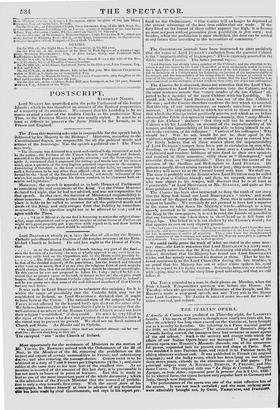The Times this morning asks who is responsible for the
speech lately delivered by his Majesty to the Bishops ? Ministers, according to the Constitutional dogma, are responsible for all the political words and actions of the Sovereign. Was the speech a political one ? The Times says truly,
"The discourse was delivertd to a great ecclesiastical body, recognized as such by the nation—the Prelate' of the United Church of Englantrand Ireland, astemblcd in the Royal presence on a public occasion; and the Sovereign, who spoke it, announced that it expressed the feelings and resoltrions of his inmost mind, upon a question of the very highest practical importance to the country. Considering it therefore in the most nunlerate and sober light, we cannot hold such a declaration to be any other than official—than an act deliberately per- formed by the head of the Established Church,' not merely indicative of his wialies, but morally binding upon his future conduct, in his character both ex- ecutive and legislative."
Moreover, the speech fs appealed to in both Houses of Parliament as containing the real sentiments of the King. Yet the Prime Minister declared last night, that he had not, advised, and was not responsible for that speech. In that case, the doctrine of Ministerial responsibility is sheer nonsense. According to that doctrine, a Minister who retains hiss place is liable to be called to account for all the political words and deeds of the King, and only escapes from that liability by imtnediate resignation. This question ought not to be allowed to rest; and we agree with the Times,
. . . . . "Vie if alinisters do not find it becoming to notice the subject them- selves, S011te independent and repeetable member of either House of Parliament might with great propriety put a question with regard to it, and draw forth a reply by which the public mind would be satisfied.'






















 Previous page
Previous page